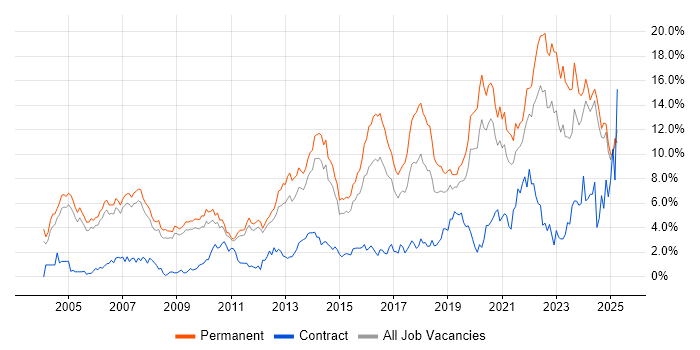Software Engineering
Nottinghamshire > Nottingham
The table below provides summary statistics and salary benchmarking for jobs advertised in Nottingham requiring Software Engineering skills. It covers permanent job vacancies from the 6 months leading up to 27 February 2026, with comparisons to the same periods in the previous two years.
| 6 months to 27 Feb 2026 |
Same period 2025 | Same period 2024 | |
|---|---|---|---|
| Rank | 15 | 18 | 11 |
| Rank change year-on-year | +3 | -7 | -2 |
| Permanent jobs citing Software Engineering | 44 | 46 | 81 |
| As % of all permanent jobs in Nottingham | 7.21% | 10.48% | 15.40% |
| As % of the Processes & Methodologies category | 9.19% | 11.39% | 17.92% |
| Number of salaries quoted | 41 | 34 | 78 |
| 10th Percentile | £45,000 | £48,250 | £41,250 |
| 25th Percentile | £50,000 | £57,500 | £45,000 |
| Median annual salary (50th Percentile) | £65,000 | £65,000 | £56,250 |
| Median % change year-on-year | - | +15.56% | -10.00% |
| 75th Percentile | £82,500 | £72,188 | £68,750 |
| 90th Percentile | £100,000 | £73,750 | £81,625 |
| Nottinghamshire median annual salary | £65,000 | £65,000 | £52,500 |
| % change year-on-year | - | +23.81% | -12.50% |
All Process & Methodology Skills
Nottingham
Software Engineering falls under the Processes and Methodologies category. For comparison with the information above, the following table provides summary statistics for all permanent job vacancies requiring process or methodology skills in Nottingham.
| Permanent vacancies with a requirement for process or methodology skills | 479 | 404 | 452 |
| As % of all permanent jobs advertised in Nottingham | 78.52% | 92.03% | 85.93% |
| Number of salaries quoted | 287 | 191 | 385 |
| 10th Percentile | £28,650 | £24,649 | £31,100 |
| 25th Percentile | £32,500 | £38,750 | £37,500 |
| Median annual salary (50th Percentile) | £45,000 | £55,000 | £52,500 |
| Median % change year-on-year | -18.18% | +4.76% | -4.55% |
| 75th Percentile | £70,000 | £67,500 | £65,000 |
| 90th Percentile | £82,500 | £79,045 | £75,000 |
| Nottinghamshire median annual salary | £42,500 | £55,000 | £50,000 |
| % change year-on-year | -22.73% | +10.00% | -9.09% |
Software Engineering
Job Vacancy Trend in Nottingham
Historical trend showing the proportion of permanent IT job postings citing Software Engineering relative to all permanent IT jobs advertised in Nottingham.

Software Engineering
Salary Trend in Nottingham
Salary distribution trend for jobs in Nottingham citing Software Engineering.

Software Engineering
Salary Histogram in Nottingham
Salary distribution for jobs citing Software Engineering in Nottingham over the 6 months to 27 February 2026.
Software Engineering
Co-Occurring Skills & Capabilities in Nottingham by Category
The following tables expand on the one above by listing co-occurrences grouped by category. They cover the same employment type, locality and period, with up to 20 co-occurrences shown in each category:
|
|
|||||||||||||||||||||||||||||||||||||||||||||||||||||||||||||||||||||||||||||||||||||||||||||||||||
|
|
|||||||||||||||||||||||||||||||||||||||||||||||||||||||||||||||||||||||||||||||||||||||||||||||||||
|
|
|||||||||||||||||||||||||||||||||||||||||||||||||||||||||||||||||||||||||||||||||||||||||||||||||||
|
|
|||||||||||||||||||||||||||||||||||||||||||||||||||||||||||||||||||||||||||||||||||||||||||||||||||
|
|
|||||||||||||||||||||||||||||||||||||||||||||||||||||||||||||||||||||||||||||||||||||||||||||||||||
|
|
|||||||||||||||||||||||||||||||||||||||||||||||||||||||||||||||||||||||||||||||||||||||||||||||||||
|
|
|||||||||||||||||||||||||||||||||||||||||||||||||||||||||||||||||||||||||||||||||||||||||||||||||||
|
|
|||||||||||||||||||||||||||||||||||||||||||||||||||||||||||||||||||||||||||||||||||||||||||||||||||
|
||||||||||||||||||||||||||||||||||||||||||||||||||||||||||||||||||||||||||||||||||||||||||||||||||||
